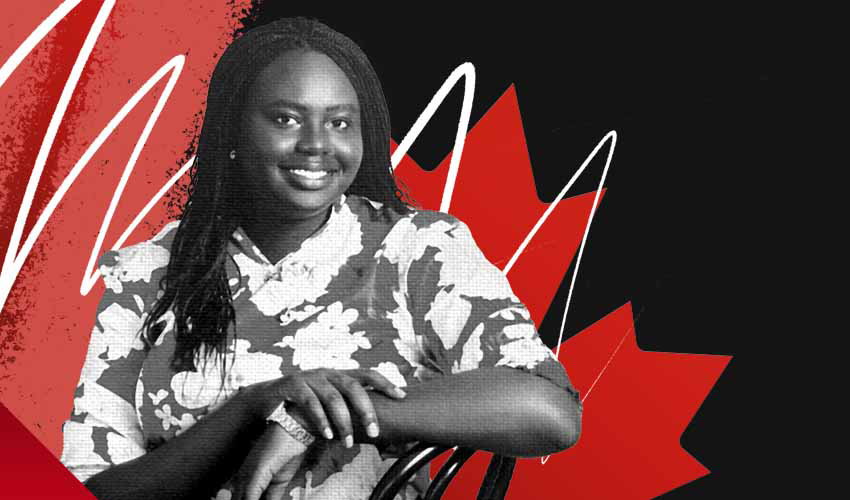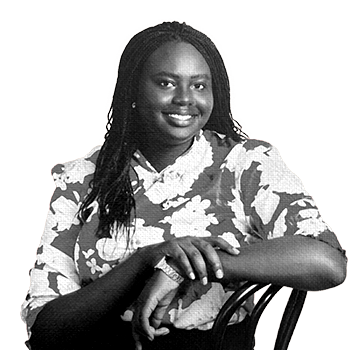THE WHITE ROOM

A first-year Bachelor of Arts — English student, Achal Chan’s goal is to finish her degree and hopefully write her own fantasy epic.
She found the colour white distasteful.
The pristine colour, though pretty, did nothing but cause her stomach to swoop low, churning and curdling like spoiled milk. White … was too easily corruptible and nearly impossible to restore. A single drop of colour; a red, a blue, made the divinity of it nothing but a mockery. A single stain on white drapery and it would never be the same again, continuing to bear the mark of its corruptor.
The white of her teeth did her no favours. She, being an avid drinker of smuggled red wine, coffee and tea, always worried about the stains they’d leave on her teeth. Much like her grandmother before her, who refused to eat the plums that grew in her backyard, stains were marks. She’d be damned if she was marked by anything but herself, beverage, fruit or person.
White did nothing but cause her ears and throat to clog with sludge, aching and ringing for relief, that goddamned colour caused her eyes to burn and muscles to coil into tight springs, it made her want to turn on her heels and high-tail it in the other direction, yet there she stood, in a room with white walls, white flooring, white furniture, white drapery, white china ... worst of all … white people, dressed in white from head to toe.
When first welcomed into their space, she was terribly sure that she would be the next strange fruit swaying in the wind.
Another person lost prematurely.
She paused. “I wouldn’t go without a fight,” she thought, forcing her lips back up into a strained smile. What would they do with the blood splattered on their pristine clothing? She was sure the blood wouldn’t be hers but theirs.
She didn’t voice these thoughts out loud, she wasn’t that low in her mental spiral to test the bounds of luck God had trapped her in, she was taught better, she knew better, if she was foolish she would have thought that they were happy to be graced with her presence but she wasn’t foolish, if she was foolish she would have ignored the dying plantation she walked through to get to the oak double doors, if she was foolish she would have ignored the whipping post, a tombstone, a testament to what side of the whip her people and theirs stood, still stained red barely half a century later, if she was foolish the gun in her purse wouldn’t feel so heavy.
She knew better.
The question was, did they know better?
She exhaled quietly, forcing her coiled muscles to relax, every nerve ending in her body screaming at her to leave. She didn't, instead, she forced her hands steady, placing each candle in its respective place. The room was obnoxious in the most simplistic way possible. The design was nothing she hadn’t seen before. Art deco was the newest in, morphing from poisonous, arsenic-filled, emerald walls, to a style that relied purely on heavy geometrics and loud vibrant colours.
Only this room, though loud, was so quiet. The only colour screaming at her was white.
Around the room, the crown mouldings and the baseboards were carved with smooth, sweeping wave-like shapes. Along the west wall was a pair of pure-white mirror cabinets. The wall opposite held a white day bed; which she couldn’t help but question, there were no windows in this room, nor were there any books to read. She was kneeling in the middle of the room, where a white oak coffee table and two single white wood inlay sofas once sat. They had been pushed towards the daybed to create space. The oldest and loudest piece in the room was an ornate, spiral, raindrop chandelier, hanging low, swinging back and forth ominously. She was sure that if she picked out every single crystal, there would be diamonds among them.
The orange flame of the candle danced around the wick, melting white wax onto the white floor beneath her knees, and she wondered what would happen if she knocked it over, what would happen if the flame just so happened to catch onto the looming woman’s skirt.
The fraud to her sincerity. Where she found herself content with being small and subtle, the Fraud was loud and large, taking up more space than she was entitled to, while she was left to beg for the scraps left at the corners of the table called life.
“I don’t normally set up my séances like this,” the Fraud commented as she took a drag of the poison they called a cigarette.
“That’s because you did yours wrong,” she wanted to say but kept her mouth shut, refusing to acknowledge the comment. “If I don’t talk, maybe she’ll stop talking,” she thought.
The Fraud did not seem deterred, her kind never seemed to care for boundaries they hadn’t laid down themselves. “Your pentagram is upside down, might I add,” she commented.
“No, It isn’t,” It came out in a mumble but the Fraud heard her perfectly in the silent room, her back straightening. The Fraud seemed to swell as she inhaled, taking up more unnecessary space.
The Fraud forced a little breathy laugh from her red-stained lips, “You have a name don’t you? What is it? I can’t keep referring to you as ‘It’ now can I?”
It. They used to call her brother an It too, the white of his church clothes had been soiled beyond recognition, his face swollen and bleeding. “Look at it!” the children cried, pointing him out from between the tree branches, a fruit overripe, ready to drop from his branch and splatter the ground. “Look at ‘It!’”
The candle in front of her flickered dangerously close to the Fraud’s skirt as said “It” bared her teeth into a syrupy smile, “If you must know, my name is Oshun. Oshun Laurens,” she introduced herself, daring to meet the Fraud’s eyes with a defiant stare. She didn’t bother holding out her hand to shake, they did not do such things with her kind of people.
The Fraud sneered slightly, opening her mouth, but Oshun was not there for such … pleasantries. She was brought here for business, not pleasure. Flicking her eyes over the east-pointing star painted on the pristine white floor, she focused on the items placed delicately in the centre of the pentagram: a few black-and-white photos, stuffed toys, old shirts, well-loved, well-worn.
“Will we be starting soon?" The soft question drew her attention away from the items to the family who were watching the two spiritualists silently. It took everything in Oshun not to flinch at the mere sight of them, the Cornberry’s, a family of four that used to be six, shadowed by grief and eager for closure. The mother was the one to take it upon herself to speak, voice resigned and filled with an exhaustion that only a mother in her situation could feel, “The children are tired,” and she laid a pale hand on her remaining son’s shoulder.
Oshun couldn’t find it in herself to feel sorry as she responded. “Soon enough, if you would please join me.” She motioned to the family to sit in a circle around the pentagram, ignoring Mr. Cornberry's resentful stare, he never liked her. “And if you could put that out,” she directed at the Fraud, motioning to her cigarette. The woman scowled, strutting away to put it out, while Oshun pulled a bundle of mixed herbs and a lighter from her bag, “As the minutes tick by we draw closer to the witching hour,” she hummed, checking her watch. “This is the time in which the veil between the physical and spiritual realms grows thin and thus makes it possible for the living to contact the long since past. I must warn you that this window of opportunity is narrow and fragile,” she explained, placing the bundle of herbs in a metal bowl sitting in the centre of the pentagram, proceeding to set the herbs ablaze. “Say what you must, and let them go.”
She could feel the hour creeping closer, looking at the people surrounding her. She felt the hairs on her arms stand on end, a painful welt forming in her throat, her knees ached against the cold white floor. The Fraud had the decency to flick off the lights as she wandered back over. The creeping shadows did nothing to shield Oshun from the holy colour.
The warm glow from the single lit candle reflected off the chandelier, leaving orange spots on the walls, a thousand eyes peering at them. A shiver crawled up her spine.
It was time.
“Are you sure you drew the pentagram correctly?” the Fraud inquired suddenly, shifting in her spot, eyes darting around the darkened room.
“The main point of the pentagram is pointing east, where the sun will rise. If I had painted it in the opposite direction, we would be summoning a demon,” Oshun whispered, stomach swooping low, the feeling of cold stiff fingers brushing her neck causing her skin to crawl.
“I’ve drawn my pentagram pointing westwards on numerous occasions. I have yet to summon a demon.” The Fraud continued to test Oshun’s patience.
“Yes, and you have yet to summon a proper spirit either.”
The Fraud opened her mouth to retort but it was too late.
The dead were ready to be listened to.
Oshun clapped her hands twice and the four unlit candles burst to life, dancing erratically, the five other participants exclaimed in shock and fear but all the spiritualist could do was grin, her face gaunt in the shadows, the firelight reflecting off the white of her teeth.
“Let us begin.”

Achal Chan
About the author
Born in Alberta and raised in Calgary, Achal Chan believes that writing has a special way of bringing attention to the world’s problems.
“I think that simply expressing your understanding of the world you live in, good or bad, is a very powerful thing no matter the circumstance,” Chan says. “With writing on difficult topics, a person opens the floor to discussion. Writing brings people together to talk and listen, and that's the first step to addressing injustices and inequalities.”
Of South Sudanese descent, Chan spent five years living in Nairobi, Kenya, starting at the age of eight.
“I was being mistreated at school (in Calgary) and became very insecure regarding things such as my skin colour, height and intelligence. My mother thought it would be better to be around kids who looked more like I did and to be closer to my own blood. I gained a lot of confidence in myself and my abilities.”
The inspiration for “The White Room” came to Chan when she came across a video that explained spiritualism and the great influence it had in the late 1800s to about the mid-1900s in America.
“In that video they went into detail about spiritualism's origins in voodoo and its eventual appropriation and exploitation by white people. The entire thing interested me a lot. This story touches on the appropriation of Black culture and is meant to showcase feeling unsafe, unwelcome and uncomfortable in predominantly white spaces.”
A first-year Bachelor of Arts — English student, Chan’s goal is to finish her degree and hopefully write her own fantasy epic.
Throughout the month of February, MRU is presenting the voices of Black writers from the community in recognition of the power of words.

